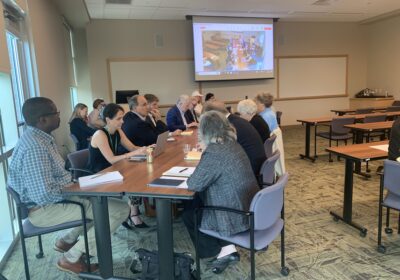BOG student rep bill moves to Senate
The Florida Senate Committee on Higher Education will begin its initial review today on whether the student representative to the Board of Governors should be elected by students or appointed by the governor.
Currently, the student and faculty representatives to the BOG are elected positions. House Joint Resolution 931, proposed by Rep. Matt Gaetz, R-Shalimar, would require the BOG student representative to be governor-appointed instead of elected by the student body presidents in the state.
The bill seeks to eliminate the “pay to play” democracy that the Florida Student Association (FSA), the association of all state universities’ student body presidents with the exception of Florida State University, imposes by requiring a membership fee. Current BOG student representative Michael Long, the student body president of New College of Florida, said colleges were required to pay $8,500 to join the association; however, the fee was revoked in January 2011. The bill, he said, would do nothing but suppress student voices.
“We need to have a student leader and a student voice on that board that is selected by students, not the governor,” he said. “You’re not going to be held accountable to your peers, you’re going to be held accountable to your university and the governor of the state of Florida, and that’s not in the best interest of students.”
Some speculated the bill was proposed after Long publicly sparred with Sen. J.D. Alexander, R-Lake Wales, over USF Polytechnic’s separation with the USF System.
In an email from Student Government (SG) Senate President Khalid Hassouneh, SG expressed its opposition to the bill.
“Many claim that this bill is intended to punish FSA and its student chair for its adamant position and unconditional support for the University of South Florida throughout the Polytechnic debate,” Hassouneh wrote. “Whether this claim is unfounded or not, we believe that it is only appropriate for the student voice on the BOG to be a democratically elected representative of the students he/she is responsible for representing.”
Yet, Long said the political implications of the bill run deeper.
The only two student body presidents who support the bill are from the University of Florida and Florida State University, he said.
“It’s pretty clear their intentions are self-motivated for their university and that it’s not what’s best for the students in the state of Florida,” he said. “They want to ensure that UF and FSU are consistently appointed to the Board of Governors so they can advance the agenda of their universities – not so they can represent the students in the state of Florida well.
“All nine other universities oppose this bill. No one wants to see this go through. There are 80,000 students between UF and FSU. There’s roughly 230,000 between all nine of us,” he said. “If this bill goes through, it’s all about politics and the influence Florida State University and the University of Florida have on our Legislature.”
UF student body President Anthony Reynolds and FSU student body President Avi Assidon did not immediately respond for comment.
Long said FSU and UF have deeper connections with the Legislature than other schools.
“They’re great politicians and they’re great at convincing people,” he said. “They’re very good at working within the legislative process and they have relationships formed with every member of the Legislature because two-thirds of our Legislature graduated from either UF or FSU. So when they get their alma mater going up to them saying, ‘This bill helps our school,’ they’re not realizing that, at the same time, this bill hurts every single student in the state of Florida.”
Long said when he spoke to a group of FSU students at the state capital on Tuesday, he felt they were unaware of the implications of the bill they were supporting.
“They said, pardon my language, ‘What the hell? I don’t want Rick Scott dictating my voice. Doesn’t that board decide on tuition? Why do we want Rick Scott doing that?'” he said. “It is very clear to me that the students at FSU and UF aren’t exactly behind what their leaders are doing.”
Long said he found it “appalling” that the bill had already gained support and moved out of the House after much student opposition.
“I am a student,” he said. “I know what’s in my best interest. I’m not a 5-year-old baby. And I’m sitting here telling (the committees) that this is in my best interest.”
USF President Matt Diaz, who will speak in opposition of the bill at the Senate Committee on Higher Education today, said the bill is one that will lead to a series of political quagmires.
“I’m outright, 100 percent against this bill,” he said. “My fear is that if this passes, the student representative position will become a political favor-piece. The person that will be appointed will either be a friend or supporter of the governor or someone whose parents supported the governor monetarily. If they try and take this seat, what stops them from taking the student position on the Board of Trustees as being elected as well? I think people have to look farther than the immediacy of it. It sets a nasty precedent.”
Diaz said the bill could pose a threat to USF students, who last had a BOG student representative in 2006.
“FSU and UF are old schooled, and … I think it’s a power play from those two schools up north that are older,” he said. “Us included, and all the other institutions, haven’t even hit 60 years old. It’s something with the prestige of UF and FSU and how old they are and how strong their alumni networks and how connected they are to the Legislature. I think it’s a real political move, and I’m not real happy with it.”






